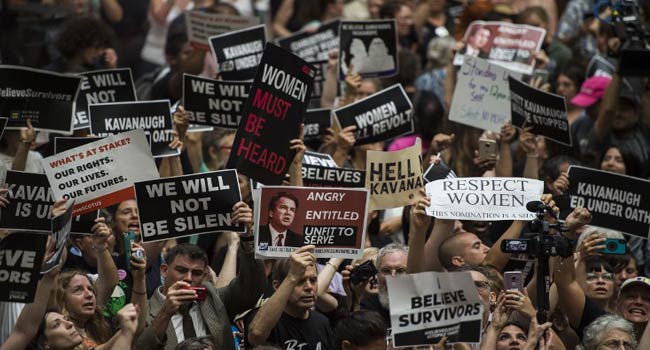
Photo: ANDREW CABALLERO-REYNOLDS / AFP
The US Senate girded Friday for a critical, too- close-to-call vote on moving ahead with the nomination of Brett Kavanaugh to the Supreme Court, as Republicans brushed aside complaints by Democrats that an FBI probe of sexual assault allegations against him was rushed and incomplete.
A final vote could come Saturday on President Donald Trump’s embattled nominee, who if approved would seal a conservative majority on the nine-seat court for decades.
A final vote could come Saturday on President Donald Trump’s embattled nominee, who if approved would seal a conservative majority on the nine-seat court for decades.
It is not a done deal, however. Republicans hold a 51-49 majority in the senate and three of their members are seen as undecided on Kavanaugh. The confirmation process which has gripped Washington and the nation and aggravated already deep political divisions reaches its climax with just weeks to go before mid-term elections.
Under new rules approved last year, 50 votes are needed for victory in Friday’s procedural vote, which is on ending debate on the confirmation and moving to a formal and definitive confirmation vote.
The vote is expected around 10:30 am (1430 GMT). That same threshold of 50 also applies to the final confirmation vote.
Thursday was a day of high drama and emotion in Washington: protesters swamped Capitol Hill and roamed the corridors of the Senate to lobby lawmakers who took turns in a secure basement room reviewing a single copy of the new FBI report on Kavanaugh.
More than 300 people were arrested at the protests, including the comedian Amy Schumer, who is a second cousin of Senate Democrat leader Chuck Schumer, and model Emily Ratajkowski.
Republicans insisted that a nearly week-long investigation, summed up in the FBI dossier, had turned up nothing to corroborate the sexual assault allegations against the 53-year-old Kavanaugh, who now sits on a federal court in Washington.
Democrats assailed the probe as an incomplete vetting constrained by a White House determined to push through the lifetime appointment of Trump’s man.
The nominee himself closed out Thursday’s fast-moving events by taking the extraordinary step of publishing an op-ed piece in The Wall Street Journal to defend himself as impartial.
Kavanaugh stood by his performance during last week’s Senate Judiciary Committee hearing at which he denied the misconduct allegations, made at the same hearing, of a California university professor.
Christine Blasey Ford said Kavanaugh drunkenly groped her and attempted to rape her when they were teenagers attending a party in suburban Washington in the early 1980s. Two other women have also accused him of sexual misconduct during his university years.
In his testimony, Kavanaugh complained about “a calculated and orchestrated political hit fueled with apparent pent-up anger about President Trump and the 2016 election.”
He also said the allegations against him were part of what he called a leftwing conspiracy to keep him off the court. His combative and at times downright angry performance drew criticism that Kavanaugh lacked the unbiased, judicious demeanor needed to sit on the high court.
But his Journal piece, headlined “I am an independent, impartial judge,” appeared aimed squarely at Republicans on the fence who have expressed concerns about his temperament and partisan attacks during the hearing.
“I know that my tone was sharp, and I said a few things I should not have said,” Kavanaugh wrote, arguing he was “forceful and passionate” in denying the allegations against him.
“I do not decide cases based on personal or policy preferences,” he added, saying the country’s top court “must never be viewed as a partisan institution.”
The self-defense came too late for John Paul Stevens, a retired Supreme Court justice who on Thursday said he once believed Kavanaugh to be a fine judge.
“But I think that his performance during the hearings caused me to change my mind,” Stevens said in Florida.
‘No hint of misconduct’
A sea of women — thousands of protesters — marched on Washington Thursday, bursting into the Hart Senate Office Building to hold loud sit-in demonstrations against the judge. Some held signs calling Kavanaugha liar and unfit to serve.
Capitol Police said the 300-odd detainees were processed on site and released after being charged with offenses such as obstructing a public space or unlawful demonstration.
“I believe Kavanaugh is part of a Big Old Boys club that is going to protect him no matter what,” said Angela Trzepkowski, 55, from Delaware.
The New York Times said more than 2,400 law professors signed a letter opposing the nomination, saying that at the confirmation hearing Kavanaugh “did not display the impartiality and judicial temperament” required for the Supreme Court.
Republicans defended him. “This investigation found no hint of misconduct,” Senate Judiciary Committee chairman Chuck Grassley said. “There’s nothing in it that we didn’t already know.”
Two of the three Republican lawmakers undecided on the nominee boosted his confirmation chances by signaling they believed the FBI had done a thorough probe.
All eyes are on those key Republicans who could make or break the confirmation — Jeff Flake of Arizona, Susan Collins of Maine and Lisa Murkowski of Alaska.
Complicating things for the Republicans, another of their senators, Steve Daines of Montana, announced Thursday night that he has a scheduling conflict: his daughter is getting married Saturday in that western state and he plans to attend.
That could be bad news as Republicans need every vote they can get. The office of Senate Majority Leader Mitch McConnell said it is trying to figure out what to do.
The top Senate Judiciary Democrat, Dianne Feinstein, said the report appeared insufficient to lay to rest concerns about Kavanaugh.
“It looks to be a product of an incomplete investigation that was limited perhaps by the White House, I don’t know,” Feinstein told reporters.
AFP







